Google’s AI Overviews – a new generative AI search results feature – was rolled out to all users in the US starting from 14th May, following an announcement at I/O 2024.
Powered by a custom model of Google’s chatbot technology, Gemini, this feature reshapes the way we research, plan, and even brainstorm using the search engine. When triggered by your query, AI Overviews provides a handy summary on the topic, pieced together from various sources, along with links to pages you can visit to learn more.
The aim is to make it easier for us to find the answers we need without having to spend minutes or even hours visiting different webpages, clicking back and forth from search results. To quote the official slogan: “Google will do the Googling for you. Just ask.”
This is exciting news for search engine users, with the potential for AI Overviews to revolutionise the way we access information and unlock new possibilities for online research. Understandably, given that this feature can remove the need to browse the traditional organic listings or even visit webpages from search, it has also ruffled the feathers of some website owners and those in the wider digital marketing community. In certain cases, we’ve seen speculation that this could spell the death of SEO, but the reality is that it simply changes the nature of the game (more on this below).
So, what does all of this really mean for us in practice? And what new functionalities does AI Overviews have to offer? Read on to discover the answers to these questions and more.
NOTE: This article was originally published to coincide with the launch of AI Overviews. It will be updated routinely to reflect changes and provide additional information.
- What are Google’s AI Overviews?
- Unpacking the key features of AI Overviews
- Fine-tuning responses
- Search with video
- View organised search results
- What does this mean for SEO?
- AI Overview link cards generate higher CTRs than traditional results
- How common will these Overviews be? And how much pixel space will they take up?
- Clicks from AI Overviews won’t be differentiated in Google Search Console
- Can you optimise for AI Overviews?
- SEO by Impression
What are Google’s AI Overviews?
AI Overviews are a new Google search results feature offering users AI-generated answers to their queries or summaries of topics. They combine information from multiple sources and provide useful links for further research, using state-of-the-art chatbot technology powered by a custom model of Google Gemini.
Similar to Microsoft Copilot in Bing, this approach transforms the traditional search journey by offering information from a range of different places in a single view. There’s no longer a need for the user to navigate through several webpages from search to find what they’re looking for – and, again like Copilot, AI Overviews direct users to webpage links where they can access more information.
Despite the similarities, the search engine giant certainly plans to use AI Overviews as a platform from which to step up its game in the ongoing Bing versus Google battle. As announced in the Google I/O 2024 keynote (00:41:30 to 00:55:18), Google Search Labs has been working on the development of a range of awesome new features to enhance our experience of Search even further in the coming months. These include the ability to adjust Overviews to provide simpler or broken down summaries and, on the flip side, ask complex questions that require multiple steps of reasoning and receive a consolidated answer in one interface.
The core concept behind this feature first entered testing back in May 2023 with the launch of Search Generative Experience (SGE), an opt-in experiment conducted by Google Search Labs to refine the technology prior to general rollout. Since then, early access test users have submitted billions of queries and received SGE responses, providing Google with the training data needed to help launch this new offering – now rebranded as AI Overviews.
AI Overviews is currently only available in the US, but is expected to be rolled out in other countries shortly.
Unpacking the key features of AI Overviews
At the time of its US rollout, AI Overviews provided users with a simple interface containing an AI-generated response (based on results from Google’s index) and a set of citation links (known as ‘link cards’) beneath the summary.
In this screenshotted example provided by Google, the user’s query is ‘how do you clean a fabric sofa’. By amalgamating information sourced from articles and forums online, Gemini is capable of composing a summary that outlines some tips for achieving this task, followed by tiles beneath that provide links to the sources of this information.
This is the foundation of AI Overviews: providing digestible answers to quick questions, then giving users the option to go further with their research if they choose to visit the cited webpages. And to begin with, this will only apply to searches relating to dining and recipes. But very soon, it will also cover:
- Films
- Music
- Books
- Hotels
- Shopping
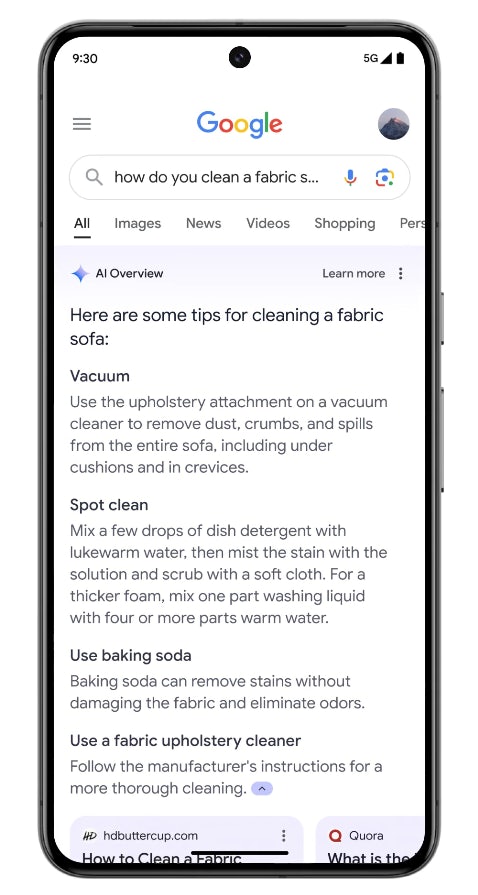
In the longer term, Google Search Labs is looking to open AI Overviews up to a much wider spectrum of topic areas. There are also plans to build on its functionalities in several clever ways, which have been teased but are yet to be rolled out at the time of writing. Read on for a snapshot of what we can expect to come.
Fine-tuning responses
One of the next features to come will be the ability to adjust your AI Overview for either a simpler response – which could be useful for explaining complex topics to children – or a breakdown, handy in cases where you need to see a more detailed view of a topic, broken down into bitesize sections. These adjustments will be controlled by buttons positioned at the top of the search results, as shown in this screenshot:
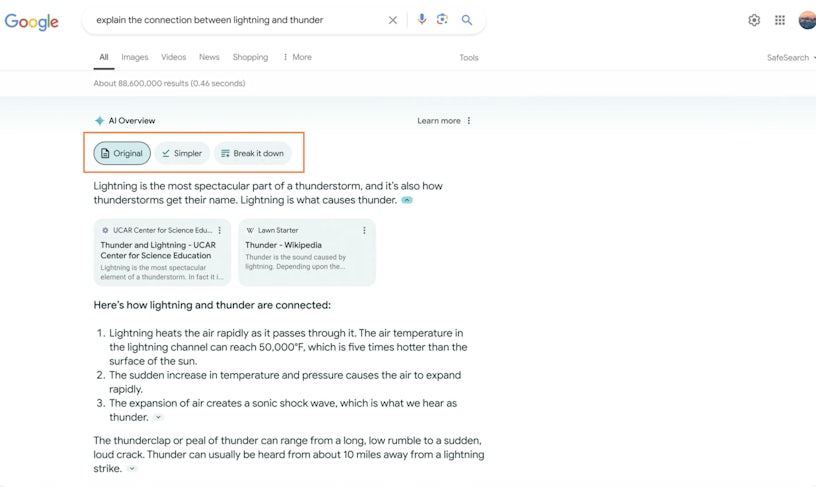
Source: Google
In the example highlighted by the screenshot below, we can opt to view a simpler Overview. Here the user has submitted the query ‘explain the connection between lightning and thunder’, then requested a simpler summary of the response:
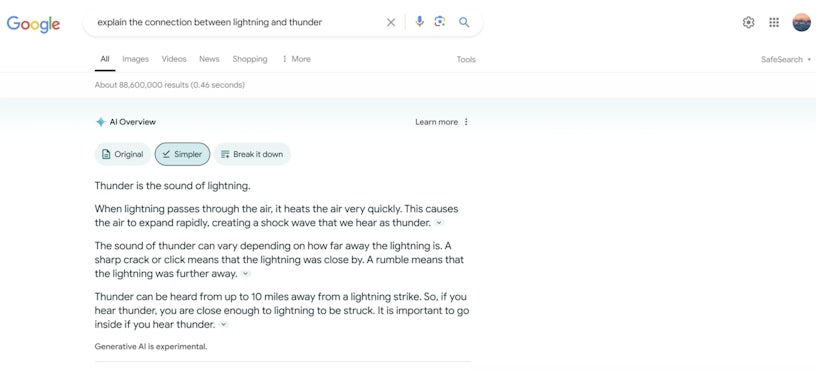
Source: Google
Alternatively, there’s the option to see a more detailed ‘break it down’ Overview, as shown here:
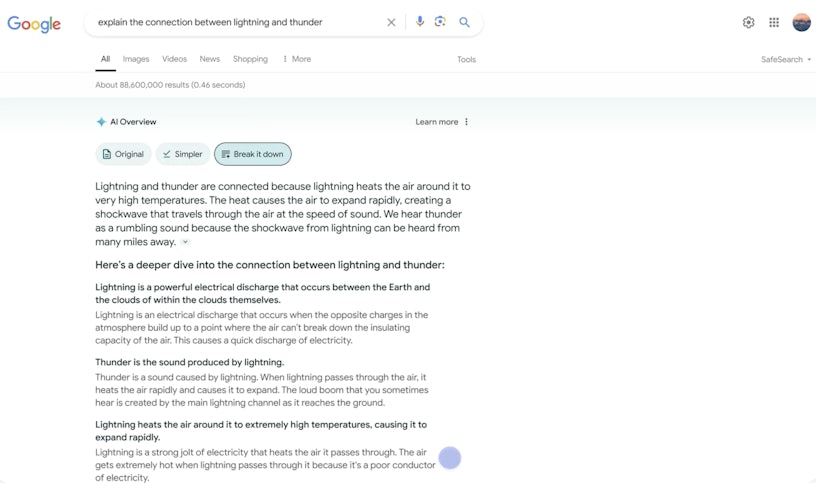
Source: Google
Search with video
Since the advent of Google’s Multitask Unified Model (MUM) in 2021, the search engine has made significant strides in multimodal technology, allowing it to gain a better understanding of information from different sources, such as webpages, images, and even videos. We have already seen this put to use in Google Lens, a Google app that lets you explore and find answers online using photos.
The search engine now has plans to facilitate video search. Soon, we’ll be able to submit videos via Lens, ask a question, and receive AI Overview responses, opening up compelling new ways for users to understand the world around them.
In the live demo during I/O 2024 (00:50:05 onwards), Lens is able to take a video of a record player with a faulty tonearm, combined with the question ‘why will this not stay in place?’, and provide an AI Overview (as shown in the screenshot here).
What’s impressive is that the software recognises:
- The name of the faulty part (in this case, the tonearm on a record player).
- The brand and model of the record player.
- That the tonearm may be unbalanced.
From this, Gemini is capable of assembling a short but useful summary of tips that could help, linking to a relevant how-to article on the topic, and suggesting some other possible issues that could cause a tonearm to move as shown in the user’s video.
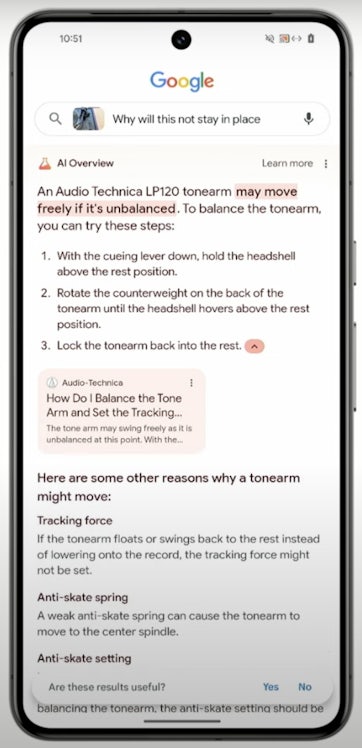
View organised search results
Pushing ahead far beyond what we’re seeing from AI Overviews in their current iteration, we’ll soon be able to use Google as a brainstorming tool thanks to advanced categorisation of search results.
Take the example of a user searching for ‘anniversary celebration dinner places’ in their area – when the new generative AI categorisation comes into effect, search results will be broken down into a range of sections to aid research, from a map highlighting ‘anniversary-worthy restaurants’ in your local area through to ‘critic picks for special occasions’.
It’s easy to see how this technology could be applied to a wide range of other searches going forward. You can imagine, for example, a user searching for the best films in a given category and being presented with a selection of different sub-genres, moods, or eras to choose from. And the same idea could be applied to shopping in the future, helping buyers to browse products from different subcategories in one space before making their decision.
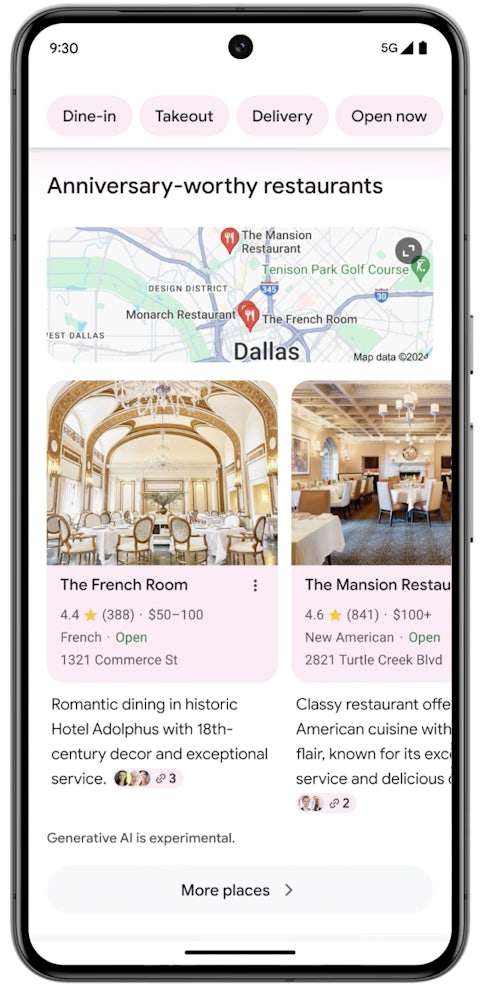
What does this mean for SEO?
From a user perspective, then, AI Overviews seem pretty cool: just from one quick look at the features that’ll be on offer, it’s easy to see how it could revolutionise the way we research online. But not everyone is happy.
On the one hand, we’ve already seen evidence of some grotesque generative AI gaffs that will impact everyone – some of these errors may just mar the user experience, whereas others could be potentially dangerous. On the other hand, it’s really the SEO community that is up in arms about what AI Overviews holds for the future of Search. And you can understand why. Over time, we’ve seen the introduction of new SERP features like this, shifting search results away from the traditional ‘10 blue links’ towards a more immersive experience. With users increasingly able to find answers, solutions, or products directly in the search results without visiting pages outside of Google, some sites have seen the erosion of organic click-through rates (CTRs).
Surely this scenario is only set to get worse as AI Overviews appear for search queries across an expanding range of topics, vying for attention and clicks? Logic might lead us to this conclusion, but some of the initial indications we’ve seen suggest otherwise…
AI Overview link cards generate higher CTRs than traditional results
Hema Budaraju, Google’s senior director of product for the new feature, shared in an interview with Search Engine Land that CTRs on AI Overview link cards are higher than standard web results. She likens them to featured snippets, which often see the lion’s share of clicks on a results page, at the expense of listings lower down the page.
For those sites that can capture the coveted link cards, there may well be additional clicks up for grabs. But, with so much focus and attention now placed towards the top of the search results, it remains to be seen what share of the clicks the traditional universal listings lower down will receive.
How common will these Overviews be? And how much pixel space will they take up?
With SGE having been in testing via Search Labs for a year prior to the launch, Google has had plenty of time to experiment with the types of queries to show Overviews for – and how often. Early numbers suggested that they could be shown on as much as 75-80% of all queries, but the most recent figures give a much more conservative estimate of AI Overviews coverage:
Only time will tell as to the true extent of the impact, but Onely’s analysis suggests that at this point as little as 14% of queries might automatically return AI Overviews – with 28% giving users the option to generate a summary, and 58% presenting no generative AI features at all.
BrightEdge Generative Parser data has also shown that the amount of pixel space occupied by Overviews is shrinking on average, decreasing from 1,200 to just 1,050 pixels over the course of April 2024. It seems, then, that this new search results feature is appearing less frequently and taking up less space than we saw during the initial testing phase.
Clicks from AI Overviews won’t be differentiated in Google Search Console
Although AI Overview link cards may receive higher CTRs than other organic listings, it isn’t possible to monitor this for yourself at present. Unlike with some other Search Appearances, Google Search Console doesn’t offer the ability to filter by Overview traffic; clicks and impressions will be recorded in the platform (as with standard organic listings), but there won’t be any filtering options to help you narrow things down.
This clearly presents challenges for reporting on how we’re performing. And without access to the necessary data, at this stage there’s no quantitative way of assessing whether we’re even remotely on the right track when it comes to optimising for AI Overviews.
Can you optimise for AI Overviews?
Following this train of thought, the lack of segmented AI Overview data begs the question: can SEOs even optimise for AI Overviews?
Access to Google’s SGE during the testing phase has meant that specialists have already been able to experiment with how to acquire Overview link cards for some time now (and this, in itself, could be the basis of an entirely separate article).
Whilst we are yet to see any conclusive results from testing, the following general inferences have been made:
- Some conventional ranking factors still apply – that is, fast and technically sound sites with authoritative backlink profiles, clear topical authority, and strong UX tend to win out. This is supported by the fact that pages featuring in the top ten results are more likely to earn link cards.
- It seems as though at least some ranking factors are different, as almost half of link card citations do not appear in the traditional results.
- Content that exactly matches the phrasing of a query is often selected. Shorter pages that directly answer questions may be favoured over long-form guides. You may also want to adapt your content to fit closely with relevant Overviews showing in search results.
- Overviews often combine short, easy-to-read paragraphs that are written in simple language. Focusing on readability could therefore help you to pick up link cards.
- Information gain remains a key focus. As always, the more you can add to the conversation with your content and individual answers (rather than repeating the same information available elsewhere), the greater the likelihood that you’ll rank.
At this point, these are just speculations made by commentators in the SEO community based on the Overviews seen in the wild so far. We’ll update this article with the proven facts and confirmed ranking factors, as and when they’re available.
SEO by Impression
The rollout of Overviews is just the beginning of how generative AI will influence Search and SEO. Looking to stay ahead of the curve and get the edge on your competition? Visit our SEO agency page or speak to our team today to find out how we can help.





